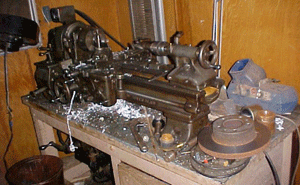He was deeply bent, with gnarly hands swollen from too many years in contact with engine grease. His thick, yellowed glasses, covered bushy eyebrows. An ever-present cigar drooped from one corner of his mouth and a paunch the size of Texas hung out over his belt. He seemed to always wear the same grease stained blue coveralls carefully buttoned to his chin. His shop was an old barn that had obviously stood long before the city grew out and surrounded him. He was there long before the busy four lane roared behind his six foot dilapidated wooden fence. He was probably there when there was little more than a horse path winding past his property.
An ever-present cigar drooped from one corner of his mouth and a paunch the size of Texas hung out over his belt. He seemed to always wear the same grease stained blue coveralls carefully buttoned to his chin. His shop was an old barn that had obviously stood long before the city grew out and surrounded him. He was there long before the busy four lane roared behind his six foot dilapidated wooden fence. He was probably there when there was little more than a horse path winding past his property.
On his side of the barrier, piled as high as the fence, lay two acres of old cardboard boxes, broken refrigerators, stripped washing machines, rusted car bodies, burnt out blenders, thread bare tires, bankrupt brake shoes, decomposing engines, drums of used oil, casks of roofing nails, rusty gooseneck drains and miles of corroded water pipe.
The barn/shop carried a mixed smell of grease and cigars. It was so crowded with stuff, we were forced to walk down narrow isles, dodging the more valuable objects he was keeping out of the rain. Brass pipe fittings, antiquated tools, a drill press made before the turn of the century, and an engine lathe with a ten foot bed.
Surrounding the lathe, surrounding every standing tool, interlaced with oil stained drawings and empty small parts boxes, was a mountain of accumulated curled metal chips. Everything could easily have been there before the second world war.
At that time I customized Harley-Davidson’s, including rebuilding the engines. I went to him because, though he could hardly move from one work station to another without a profusion of groans and moans, he was the best machinist in a ten mile radius. Many times, I watched him create a steel machine part by simply by going out into one of his piles and finding an old rusted plug of metal, then clamping it into his lathe and trimming off the excess.
I came to him to have Harley piston cylinders re-bored. It was a simple request, one he only charged ten dollars to accomplish. Weekly, I fed him a steady supply of engine barrels and over the months we struck up a working relationship.
I learned to save up my cylinders and take them over at the end of the week with a six pack of beer. When I had time, I loved to sip beers and rummage around in his shop. He had stories. “This old oil pump came out of a thirty-seven ford,” he said. “The six inch thick stainless steel shaft standing in the corner will some day be the drive shaft for a ship that’s being built. This is a carburetor for a forty-nine Hudson.” He had a place in his memory and a story for each object. We often sat around, drinking a beer or two, talking about days past. One day we got around to my favorite subject; motorcycles.
He got a gleam in his eye. “Behind that lathe,” he said, “under that pile, is an old motorcycle I parked back there, oh. . .I’d say twenty-five years ago. We could pull it out and have a look at it if you want.”
“If I want,” I thought. “I’d love it.”
We spent the next hour carefully moving old radiators, clutch linkage, the rotting wooden prop of a bi-plane from the thirties, spoke wheel rims from a model ‘T’, and a profusion of rusted rejected machinist workings. Each removal brought on another story. Each carefully displaced object another tale of adventures of younger days. It was an unraveling of his life.
We finally got down to the motorcycle and opened up a path to pull the bike outside. He pushed it out under the shade of the ancient pepper tree. The tires were rotted. The leather seats and saddlebags were cracked and broken from neglect, but the paint was still bright red. It was as close as I ever got to an un-restored, in-line four cylinder 1927 Indian ‘Ace’ motorcycle. It was easily as big as a Harley.
The sparkle in his eye brightened when he said, “Get me that can of gas over there and let’s start it.”
“After all these years will it still start?” I asked.
“When they made something back in those days, they made em’ to last. I’ll bet you the next six pack this thing’ll start first try.”
So I bet him. We poured the fresh gas into the rusted tank, drained the carburetor and changed the coagulated oil. He painstakingly swung a leg over the bike, pulled the distributor around to retard the spark, leapt into the air and put his full weight on the kick starter. The engine kicked over, started and purred like it had a fresh tune-up.
There were many six packs of beer to be shared on many Fridays, but none I remember as well.
Even today, thirty years later, whenever I’m working with my lathe, I think of that old guy and his surprise under the piles of trash.
